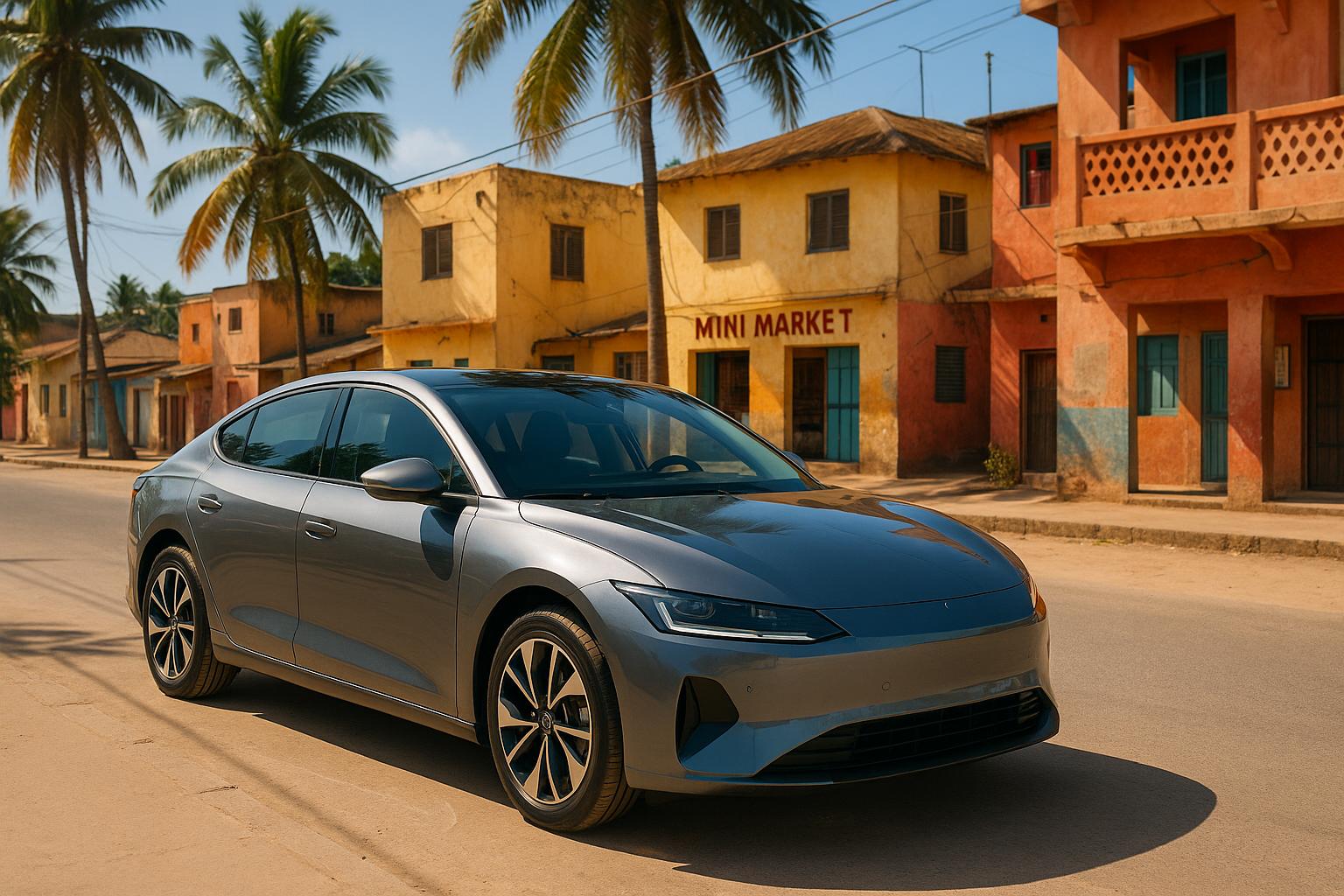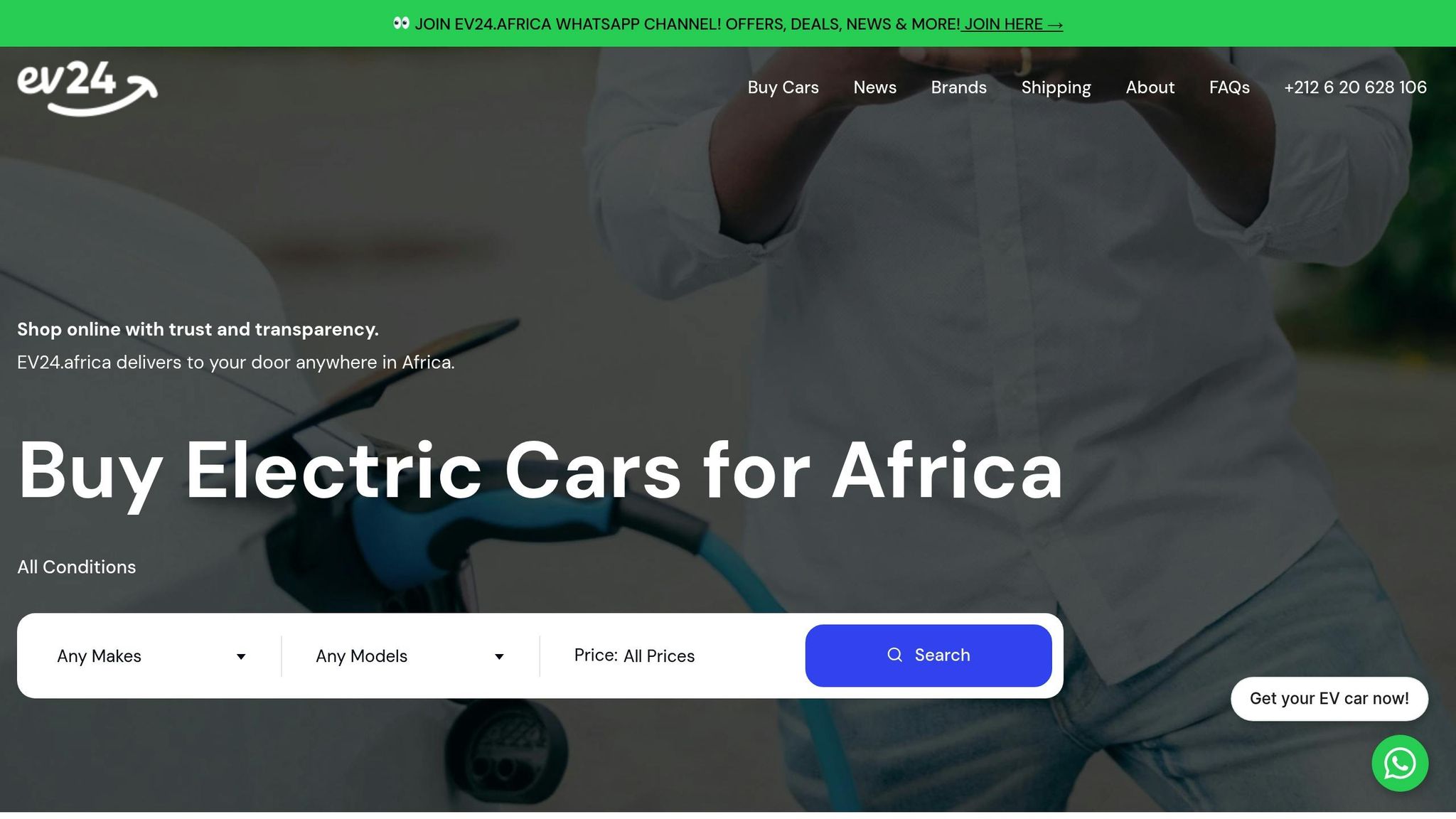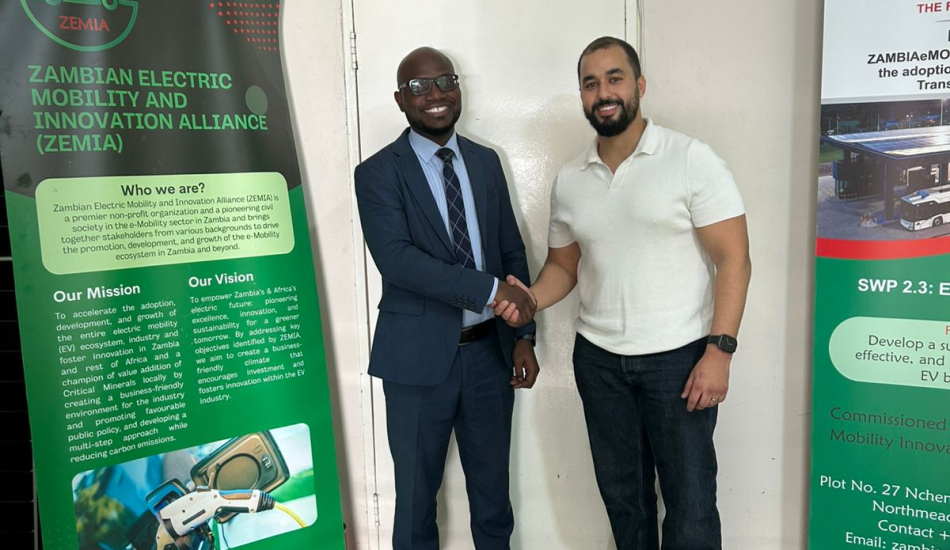
Electric cars are becoming a practical option in Gambia, driven by rising fuel costs and interest in cleaner transportation. Here’s what you need to know:
- Why EVs? Lower fuel and maintenance costs make EVs a cost-effective choice. For example, driving 15,000 km annually costs about $265.50 in electricity versus $1,080.00 for fuel – a savings of $814.50.
- Buying Process: Platforms like EV24.africa simplify importing EVs, offering top brands like Tesla, BYD, and Hyundai. Delivery takes 6–12 weeks, with options for financing and home delivery.
- Challenges: Public charging stations are limited, so home charging setups are essential. Most EV owners rely on Level 1 or Level 2 chargers.
- Models to Consider: Tesla Model 3, BYD Seal, Hyundai IONIQ 5, and Toyota bZ4X are popular 2025 models, offering ranges from 211 to 358 miles and advanced features suited to Gambia’s climate.
Switching to an EV is a smart move for cost savings and modern driving in Gambia. Keep reading for a detailed guide on models, prices, and the purchase process.
Electric Vehicle Market in Gambia
EV Market Growth in Gambia
The electric vehicle (EV) market in Gambia is still in its early stages but is steadily gaining traction. Government policies and initiatives are playing a key role in driving this growth.
Government Support and Tax Benefits
To encourage the adoption of EVs, the Gambian government has introduced measures designed to make these vehicles more accessible. One of the most impactful steps has been reducing import duties, which helps lower the overall cost for consumers. As cargambia.com highlights:
"Initiatives such as reduced import duties on electric vehicles and the development of charging infrastructure are key to supporting this transition." – cargambia.com
These policies create a more welcoming environment for EV buyers. However, it’s important for potential buyers to stay updated on the latest regulations, as changes to import rules and tax structures can occur.
Charging Stations and Infrastructure
While government incentives are a step in the right direction, the availability of charging infrastructure remains a major hurdle. As of early 2025, public charging stations in Gambia are scarce. In fact, major global databases do not yet list a comprehensive public charging network in the country. This lack of infrastructure means that most EV owners rely heavily on home charging, with private charging setups becoming increasingly common.
Unlike other countries that boast hundreds of public charging stations, Gambia’s EV ecosystem is still centered around home charging solutions. Although the government has acknowledged the need to expand the public charging network, concrete timelines and detailed investment plans have not yet been widely shared.
For those considering an EV, it’s essential to assess whether their home can accommodate the necessary charging equipment. Despite the challenges, individuals with reliable home charging setups and driving habits suited to this model can still effectively use EVs in Gambia.
Best Electric Car Brands and 2025 Models in Gambia
Top EV Brands and Models
If you’re exploring electric vehicles (EVs) in Gambia, the 2025 lineup offered by EV24.africa showcases some of the leading brands, all designed with advanced technology and tailored for the African market.
Tesla continues to be a favorite among EV enthusiasts. The Model 3 and Model Y stand out with their sleek designs and over-the-air software updates. The Model 3, in particular, is a hit with urban tech-savvy buyers, thanks to its autopilot features and modern aesthetics.
BYD, a major Chinese automaker, has made significant strides with models like the Seal and Dolphin. These vehicles are crafted to handle a range of climates, with BYD’s proprietary battery technology ensuring reliable performance even in high temperatures.
Hyundai brings the IONIQ 5 and IONIQ 6 to the table, both featuring ultra-fast charging and roomy interiors. The IONIQ 5 can charge from 10% to 80% in just about 18 minutes, making it a practical choice for drivers on the go.
Toyota introduces the bZ4X, an all-electric SUV built on decades of automotive reliability. With a focus on conservative battery management, Toyota ensures durability and longevity, which is particularly appealing for buyers planning for long-term use.
Other noteworthy brands include Geely, Dongfeng, and Leapmotor, which are also gaining traction in the region.
Model Feature Comparison
To help you decide which EV suits your needs, here’s a quick comparison of key specifications for some of the top models available in Gambia:
| Brand/Model | Range (miles) | Battery Size (kWh) | Charging Time (0-80%) | Key Features |
|---|---|---|---|---|
| Tesla Model 3 | 272-358 | 60-82 | 30-45 minutes | Autopilot, over-the-air updates, premium interior |
| BYD Seal | 323-354 | 61.4-82.5 | 30 minutes | Heat pump, advanced safety systems, spacious cabin |
| Hyundai IONIQ 5 | 303-305 | 77.4 | 18 minutes | Ultra-fast charging, V2L capability |
| Toyota bZ4X | 228-252 | 71.4 | 30 minutes | All-wheel drive option, Toyota reliability, conservative battery management |
| BYD Dolphin | 211-265 | 44.9-60.48 | 30 minutes | Compact design, affordable pricing, efficient city driving |
Most of these 2025 models offer sufficient range for both daily commutes and regional trips, but it’s essential to consider your driving habits when choosing the right vehicle.
Battery technology is another factor to weigh. Tesla’s lithium-ion batteries are known for their durability, while BYD’s Blade Battery technology enhances safety and thermal stability in warmer climates. Hyundai focuses on rapid charging, and Toyota prioritizes battery longevity with its conservative approach.
In Gambia’s climate, features like heat pumps and robust air conditioning systems are crucial for maintaining both battery efficiency and passenger comfort. Models such as the BYD Seal and Hyundai IONIQ 5 are equipped with advanced thermal management systems to minimize the impact of extreme temperatures on range.
When it comes to technology integration, Tesla leads the pack with its sophisticated software ecosystem, offering everything from navigation to entertainment via a central touchscreen. Brands like Hyundai and BYD, while more traditional in their interfaces, still include modern smartphone integration for added convenience.
Lastly, build quality and durability are key for long-term ownership. Toyota’s reputation for reliability extends to its electric lineup, while Tesla has made strides in improving manufacturing quality. Chinese brands like BYD and Geely are also focusing heavily on quality control to meet global standards.
These features not only influence how these cars perform but also play a role in their pricing and overall ownership experience, which will be covered in the next section.
Electric Car Prices in Gambia: 2025 Guide
New and Used EV Price Ranges
Electric vehicles (EVs) in Gambia come with varying price tags, depending on the brand, model, and whether the car is new or used. New EVs generally cost more than traditional gasoline cars, while used models provide a more affordable way to transition to electric without sacrificing performance. Although the upfront cost of an EV may seem steep, the savings over time can be substantial. For instance, if you drive 15,000 km per year, the electricity cost for an EV is about $265.50, compared to $1,080.00 for fuel – saving you approximately $814.50 annually.
What Affects EV Prices
Several factors influence the cost of electric vehicles in Gambia:
- Import Duties and Taxes: These remain a significant cost driver. While recent reductions and government incentives have helped, more targeted subsidies could make EVs even more affordable.
- Global Market Trends: The global EV market impacts local prices. As production scales up, manufacturing costs tend to decrease. However, supply chain disruptions, like semiconductor shortages, can temporarily push prices higher.
- Vehicle Specifications: Features such as battery size, type, and charging capabilities directly affect a car’s price. Luxury brands and high-end models naturally cost more than entry-level options.
- Currency and Inflation: Exchange rate fluctuations and inflation also play a role in determining the final price of imported EVs.
Payment Plans with EV24.africa

To make EV ownership more accessible, EV24.africa provides flexible financing options tailored to individuals and businesses in Gambia. These include leasing and traditional loan programs developed in collaboration with local financial institutions.
"We at EV24.africa are actively building partnerships with local banks to create loan products specifically for people looking to buy an electric car in Africa." – EV24.africa
If you’re planning to apply for a loan, you’ll need to prepare some documents. These include proof of income (like payslips or employer letters), a valid ID (national ID or passport), recent bank statements (covering three to six months), and a pro-forma invoice from EV24.africa. Some banks even offer eco-friendly financing options with lower interest rates for green purchases.
EV24.africa accepts various payment methods, including direct bank transfers, mobile money, and cryptocurrency, giving buyers plenty of flexibility. Once you’ve signed the loan agreement and made a deposit, the vehicle is secured, and the shipping process begins.
How to Buy and Get Your Electric Car in Gambia
Step-by-Step Buying Process
EV24.africa makes importing electric vehicles as straightforward as possible. Their platform showcases a wide variety of electric cars, complete with detailed specifications and pricing. You’ll find options from well-known brands like Tesla, BYD, Volkswagen, XPeng, Leapmotor, Changan, Wuling, Mercedes-Benz, Citroën, and Peugeot.
To begin, visit the EV24.africa website and explore their inventory. Each vehicle listing includes essential details, from battery specs to interior features. Once you’ve found the car that suits your needs, request a quote. This quote will outline the car’s price, shipping costs, and any additional fees.
After reviewing and approving the quote, proceed with payment using either bank transfer or mobile money. Once the payment is confirmed and all agreements are signed, EV24.africa takes over. They’ll handle the entire import process, keeping you updated every step of the way – from order confirmation to the car’s arrival in Gambia. After that, you can decide on the delivery option that works best for you.
Delivery Services and Wait Times
EV24.africa offers delivery services across all 54 African countries, including Gambia. Most vehicles arrive through the Port of Banjul. Depending on your preference, you can choose between door-to-door delivery or port-to-port delivery.
Delivery usually takes between 6 and 12 weeks. EV24.africa uses both RoRo (Roll-on/Roll-off) and container shipping methods. A standout feature of their service is the real-time tracking system, which keeps you updated on your vehicle’s journey from departure to its arrival in Gambian waters.
The company adheres to international trade terms like CIF (Cost, Insurance, and Freight) and DAP (Delivered at Place).
Required Documents and Legal Steps
Once your delivery details are confirmed, it’s time to handle the necessary import documentation. EV24.africa assists with navigating the paperwork and legal requirements, including customs clearance, local registration, and import taxes, ensuring your car meets Gambian regulations.
You’ll also need to work with a licensed clearing and forwarding agent. These agents have access to the ASYCUDA System used by Customs to process import documentation, make declarations, and pay duties. Key documents to prepare include:
- An import declaration form (Single Administrative Document – SAD) in triplicate, submitted to Customs
- Invoice showing Cost, Insurance, and Freight (CIF), along with the bill of lading or air waybill, certificate of origin, and packing lists
- Any additional licenses or certificates required for your specific vehicle
Once the import process is complete, focus on finalizing the legal documentation for your vehicle. EV24.africa assists with most of these steps, including the preparation of critical documents like the certificate of origin. This document is particularly important as it can influence your duty rates, depending on whether you qualify for WTO rates, the ECOWAS Trade Liberalization Scheme, or Generalized System of Preferences classifications.
sbb-itb-99e19e3
Owning and Maintaining Electric Cars in Gambia
Charging Options and Usage Tips
In Gambia, the public charging network is still in its early stages, making home charging the most dependable option for keeping your electric vehicle (EV) ready for daily use. While government initiatives aim to expand the charging infrastructure, setting up a home charging station remains key for most EV owners.
There are two main charging options for home use. Level 1 charging, which uses a standard household outlet, is slower but works well for overnight charging and short commutes. For faster charging, Level 2 chargers are a better choice, though they require professional installation.
Efforts to improve Gambia’s energy infrastructure are also underway. The World Bank has approved $52.6 million to enhance the national grid, including expanding access to rural areas, which will eventually support EV charging needs. To make the most of your home charging setup, consider charging during off-peak hours when electricity supply is more stable and potentially less expensive. Additionally, maintaining your battery’s charge between 20% and 80% for everyday use can help prolong its lifespan – reserve full charges (up to 100%) for longer trips.
Maintenance and Customer Support
One of the benefits of owning an EV is the reduced need for maintenance, thanks to their simpler design. EVs don’t require oil changes, spark plug replacements, or exhaust system repairs, which are common for gas-powered cars.
That said, there are still a few key maintenance tasks to keep in mind. Regularly check your tires for wear and maintain proper tire pressure – EVs’ instant torque can cause tires to wear out faster. Periodic tire rotation is also important. Additionally, monitor the battery cooling system and check accessories like headlights, taillights, and windshield wipers.
Another advantage of EVs is their regenerative braking system, which reduces the wear on brake pads and rotors, allowing them to last much longer than in traditional vehicles. However, when major components like the battery pack, electric motor, or inverter need attention, they are typically replaced as complete units rather than repaired.
For Gambian EV owners, there are local support options. Sub-Saharan United Vehicles, a Gambia-based EV manufacturer, provides warranty services, including parts replacement and repair. Their EV models are designed with simplicity in mind, avoiding complex components like gearboxes or chains, and eliminating the need for oil and filter changes. Additionally, EV24.africa offers ongoing support for vehicles purchased through their platform. Whether it’s technical assistance, warranty claims, or maintenance advice, their customer service team is available to help.
These lower maintenance requirements not only save time but also contribute to the overall affordability of owning an EV.
Cost Comparison: EVs vs Gas Cars
When it comes to maintenance costs, EVs are significantly cheaper than gas-powered vehicles. On average, gas cars cost about 10.1 cents per mile for maintenance, compared to just 6.1 cents per mile for EVs – a savings of nearly 40%. Over 30,000 miles, a gas car could rack up around $3,030 in maintenance expenses, far outpacing the costs associated with an EV.
In Gambia, these savings are even more pronounced. Gas cars often require frequent oil changes, filter replacements, and engine servicing, which can involve expensive imported parts. In contrast, EV maintenance tends to involve simpler tasks that are easier to manage locally.
The main ongoing costs for EVs are electricity for charging and tire replacements. While battery replacement is a costly expense, it’s rarely needed within the first 8 to 10 years or 100,000 miles of use. Plus, most EV batteries come with long-term warranties.
Another factor to consider is the volatility of gas prices in Gambia, which are influenced by fuel import costs. In comparison, electricity rates tend to be more stable, offering additional savings over time. With fewer maintenance needs, EVs also reduce downtime, as they don’t require the lengthy service appointments often needed for gas-powered cars.
First Electric Car Company in The Gambia – Buxin Electronics
Conclusion: Making the Switch to Electric Cars in Gambia
As 2025 approaches, Gambia’s electric vehicle (EV) market is reaching a pivotal moment. Rising fuel prices and reduced import duties are making EVs an appealing long-term option for buyers who want to save money and embrace modern, eco-friendly transportation.
While limited charging infrastructure remains a hurdle, advancements in battery technology and falling global EV prices are improving range and efficiency. These changes, combined with Gambia’s growing focus on renewable energy, are creating the right conditions for more widespread EV adoption.
Electric vehicles also bring financial perks that are hard to ignore. With lower maintenance and operational costs, EVs offer significant savings – especially in Gambia, where repairs for gasoline-powered cars can be costly due to the high price of imported parts. Companies like EV24.africa are stepping in to make the transition even smoother. Their services include access to top brands, affordable financing options, fast delivery, and reliable customer support, addressing many of the challenges that typically come with owning an EV.
Gambia has a real opportunity to lead the way in sustainable transportation across West Africa. By choosing an electric vehicle now, you’re not only investing in a cleaner and greener future but also enjoying the convenience of home charging and access to a growing network of support. As infrastructure develops and more people make the switch, early adopters will play a key role in shaping a more sustainable future for the country.
Switching to an electric vehicle isn’t just a step forward – it’s a leap toward the future of transportation in Gambia. With lower running costs, minimal maintenance, and a quieter ride, you’ll be driving into a more sustainable tomorrow.
FAQs
What challenges might you face when owning an electric vehicle in Gambia, and how can they be solved?
Owning an electric vehicle (EV) in Gambia isn’t without its hurdles. Some of the key challenges include a limited network of charging stations, complicated import procedures, and a shortage of local technical expertise. These factors can make it tough for EV owners to fully embrace the advantages of electric mobility.
Improving the situation starts with expanding the charging infrastructure and streamlining import regulations. Equally important is building up local EV maintenance services and technical support to provide owners with reliable assistance. On top of that, government efforts to invest in transportation and energy infrastructure are gradually creating a more supportive environment for EVs, helping residents make the shift to cleaner, more sustainable transportation options.
What support does the Gambian government provide for electric vehicle buyers, and are there any tax benefits?
The Gambian government is taking steps to make electric vehicles (EVs) more affordable by offering tax exemptions on fully electric cars. This includes waiving VAT and import duties, which helps lower the overall cost of EVs and makes them a more realistic option for buyers.
In addition to these tax breaks, efforts are underway to simplify tax policies and modernize the tax system to further encourage the shift to electric mobility. While direct financial incentives like rebates or subsidies aren’t currently available, improvements in infrastructure and backing from international partners are helping to build a more EV-friendly landscape for consumers in The Gambia.
What do I need to know about installing a home EV charging station in Gambia?
When setting up a home EV charging station in Gambia, it’s essential to confirm that the charger matches your vehicle’s connector type to sidestep any compatibility problems. To ensure safety and proper installation, always hire a licensed electrician. They’ll also verify that your circuit breaker can handle at least 125% of the charger’s load, reducing the risk of electrical overload.
Since Gambia typically operates on a 220V single-phase power system, make sure your home’s wiring complies with local electrical standards. A well-planned and professionally installed system will provide safe and dependable charging for your EV.




